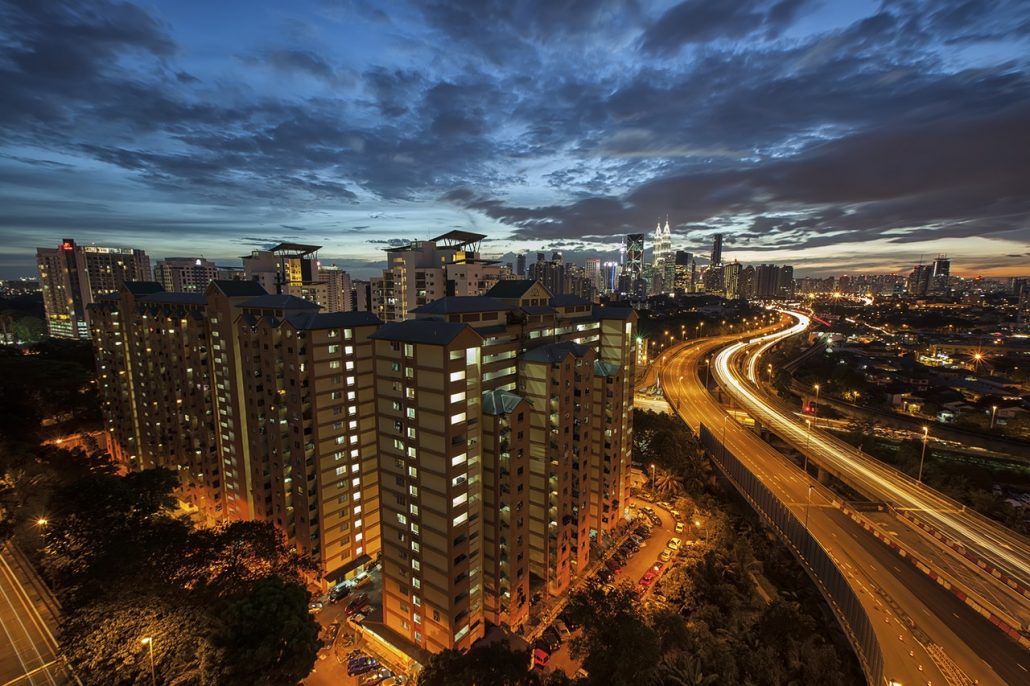Given the comparatively high home prices in Singapore, it is understandable that many Singaporeans have, over the years, turned their heads to investing overseas. Nevertheless, buying a property in Singapore can be very overwhelming; let alone buying it in a foreign country like Malaysia.
Back in 2016, I bought my first property in Danga Bay, Johor Bahru, and it was after the Malaysian government introduced a Goods and Services Tax (GST) of six percent. I viewed 5 properties before I made up my mind on the current property, which cost me about RM 420,000 (SGD $140,000).
To me, Malaysia is a truly great location to buy property, either for investment or even own stay. While Singapore’s real estate market has high entry barriers for foreign investors, Malaysia’s property market is very open to foreign investments. The Ringgit is also relatively weak in relation to many currencies at the moment.
Whether you are planning to buy property in Malaysia for investment or for your own stay, you can find plenty of good reasons to get started in. At such, I have organized the below information to help foreign investors who are interested in buying a property in Malaysia.
- Choose a strategic location
Choose popular areas in Malaysia such as Kuala Lumpur, Johor Bahru or Penang. Observe if the population in the area that you want to buy is in on an upward trend. The bigger the population, the better chance of you getting a higher return from your property investment. With a large population, there will be more activities to support the population, including malls, restaurants and supermarkets.
Other than that, choose a location that has convenient access to transportation and communication infrastructures. Plans for the Kuala Lumpur–Singapore High Speed Rail (HSR) are officially underway, and operations are expected to begin by 31 December 2026.
- How to find a property in Malaysia?
Through an agent. The estate agent fees are charged between 2% – 3% of the property purchase price. Fees can be paid by the seller, or among the buyer and the seller, depending on the agreement you strike with each individual seller. For first time buyers, a specialist agent might be recommended to help give advice and feedback within the local market. However, there is a fee to pay for this service, so please make sure you understand what you’ll get for your money, as both the packages and prices are varied.
To avoid frauds and scams, you may want to find a realtor who is registered with The Malaysian Institute of Estate Agents (equivalent to the Council for Estate Agencies (CEA) in Singapore). Choosing correct agent who holds this membership should make sure you don’t fall into the trap of any scammers.
There are many sources to find a place to buy in Malaysia such as via online portals. Reliable websites to find real estate to buy such as Property Guru Malaysia, a local search portal that allows you to search properties by regions or even by a particular agent you would want to work with. The “Malaysia My Second Home” (MM2H) retirement visa for Malaysia, has a website that includes a list of registered agents cover the entire country dealing with arriving expats.
- Buy landed or condominium?
If you are a first-time buyer, you should always think about purchasing a landed property instead of an apartment or condominium. Though the prices for landed properties are usually higher than a high-rise apartment unit, but with the benefit of individual title for each property, it can be available immediately. On the other hand, the strata title for an apartment or a condominium is always delayed and this can jeopardize you in getting financing for your property. Having the individual title prepared when you purchase a landed property can speed up your home loan approval procedure, without waiting.
- Choose under-development or completed property?
Buying an under-development project means getting a brand-new property when you receive the keys. Developers often give freebies like Free Stamp Duty, Free Legal Fees, Rebates and others. A combination of free stamp duty and legal fees basically reduce transaction costs. Coupled with low down payment schemes, the initial upfront costs can be pretty low. It’s one of the cheapest options to purchase a property.
Resale properties are not always old and run-down. In fact, you should be able to find some newly completed properties. The benefit is that you will be able to see the actual unit before you commit to purchasing it that includes the proper layout, quality of furnishing, who are your neighbors, residents of the development, nearby amenities and more. After the transaction is completed, you will be able to rent out the unit and secure income from the property immediately.
- Reputable Developer
Look out for developers with good track record, who are committed to delivering developments on time and with quality. When looking for a house, especially if it is a new sale and you are a first-time home buyer, the track record and trustworthiness of the developer selling the property is very important. Making a wrong decision to buy a house from a less reputable developer can have horrible consequences.
- Minimum purchase price
There is a minimum purchase price for foreign buyers who wish to own real estate in Malaysia. In most states, such as Kuala Lumpur, Melaka, Sarawak, Sabah and Johor, the property must cost at least RM1 million (≈SGD $318,809). In Selangor, this figure stands at RM2 million (≈SGD $636,178) and likewise for Penang if you are buying property on the island. If you are buying property on mainland Penang, the minimum price is priced at RM1 million.
However, the MM2H scheme allows foreigners to live in Malaysia and in certain states to buy property there for lower prices. In Sabah, Kelantan and Melaka, for instance, foreign MM2H participants need spend a minimum of only RM500,000 (SGD $159,044) on a property, instead of the minimum other foreigners must spend. The amount in Perak and Sarawak is even lower, at RM350,000 (SGD $111,331) and RM300,000 (SGD $95,426) respectively.
- Choose a property based on your finances
Buying a home is a big decision and definitely is one of the biggest ticket items a person will purchase in lifetime. Buyers who purchase based on emotions often find themselves in debt after such a huge ticket purchase. Also usually the case – the buyer would have already paid the non-refundable deposit. To prevent such unwarranted distresses, it’s recommended for buyers to first get an in-principle-approval from the bank before deciding on a property.
As buying a house is a huge financial decision, a buyer must think of all aspects which include the added responsibility and the finances. Find out the monthly repayment you can comfortably afford and target on properties and location fit your price range.
- Taking up a loan in Malaysia or Singapore?
MYR financing for Malaysian properties can be obtained from Malaysia-based banks. Interest rates for housing loans in Malaysia are usually quoted as a percentage below the Base Rate (BR). For example, if the current BR rate is 4.00%, the interest rate on a ‘BR + 0.5%’ loan would be 4.45%.
Singapore-based banks currently only offer SGD financing for Malaysian properties. The Singapore lenders charge a margin of between 2.5% to 3% on top of the 3M SIBOR, which makes the effective rate to range between 3.6% to 4.1%, assuming 3M SIBOR is at 1.1%.
Singapore-based banks lending in SGD typically finances between 70%-80% of the property, while Malaysia-based banks grants up to 85% financing for foreigners and up to 90% for locals, making the initial down payment more affordable at 10% of the property price.
Depending on where you are based, it can make sense to finance the property either in SGD or MYR. Suppose you are based in Singapore, it may be more convenient to take up a loan in SGD, as you would be able to pay for the monthly instalments without having to make a telegraphic transfer.
On the other hand, if you are based in Malaysia, you might prefer to borrow in MYR instead. This is especially so if the subject property is an investment property, and the rental income will be in the same currency as the monthly instalments on the loan. That said, however, when taking up a loan from a Malaysia lender, you would be required to open a deposit account and maintain it monthly.
Apart from country of residence, another possible consideration could be the currency exchange rate between both countries. Given today’s circumstances, if an investor believes that MYR will continue to weaken against the SGD, it will likely be cheaper for them in the long run as the same amount of SGD would convert to a higher amount of MYR. Hence, it might also make more sense to borrow in MYR.
- Engage an independent mortgage advisor
Find a good mortgage advisor who works with all the banks and compare all banking property loan products, to ensure you get the best housing loan offers available. Before applying for a home loan, ensure you have a clean financial record to prevent hiccups. Clear any outstanding debt with credit cards, personal loans and consolidate your debt. In Malaysia, you can also check your credit report at the Central Credit Reference Information System (CCRIS) and in Singapore, you can buy your report online.
Buyers, remember: take all things into consideration
When it comes to buying a home, you may hear that everyone shares a different story with you. Seek professional advice from experts, such as trustworthy and dependable property agents and other property owners. Do not make your home-buying decisions based on market rumors and unproven trends without first doing your own study.
Research is extremely important when buying a property. When we talk about buying a property, the first cost that comes to mind is always the initial down payment. Aside from the down payment, there are other entry costs such as legal fees, stamp duty, valuation fees and the real estate agent’s fee which are equally important, but usually overlooked.
As Iskandar Johor, one of Malaysia’s hotspots for foreign property investors, moves into its 11th year of an aspiring 20-year plan, anxieties over an excess supply of homes and the sustainability of the area still remain. However, the region continues to appeal to investors, home seekers and students from Singapore. There are several high-profile residential projects that will be completed in 2018 (or earlier), including Country Garden’s Danga Bay and R&F’s Princess Cove.
Other than those who buy solely for the sake of investing, Malaysia is definitely a destination worth considering to settle down during one’s golden years. After all, it ranks 6th on The World’s Top 10 Retirement Havens – a retirement index produced by International Living.
With all these factors in mind, investors should be able to make a well-informed decision. However, that’s not to say that it would be the end-all solution; the property market is constantly subjected to fluctuations. It is crucial for investors to keep a close eye on the current market conditions, and continue to make the necessary adjustments to ensure the most gains on their investments.
This article was first published on PropertyGuru on September 21 2017.
Want to find the best mortgage rate in town? Check out our free comparison service to learn more!
Read more of our posts below!



